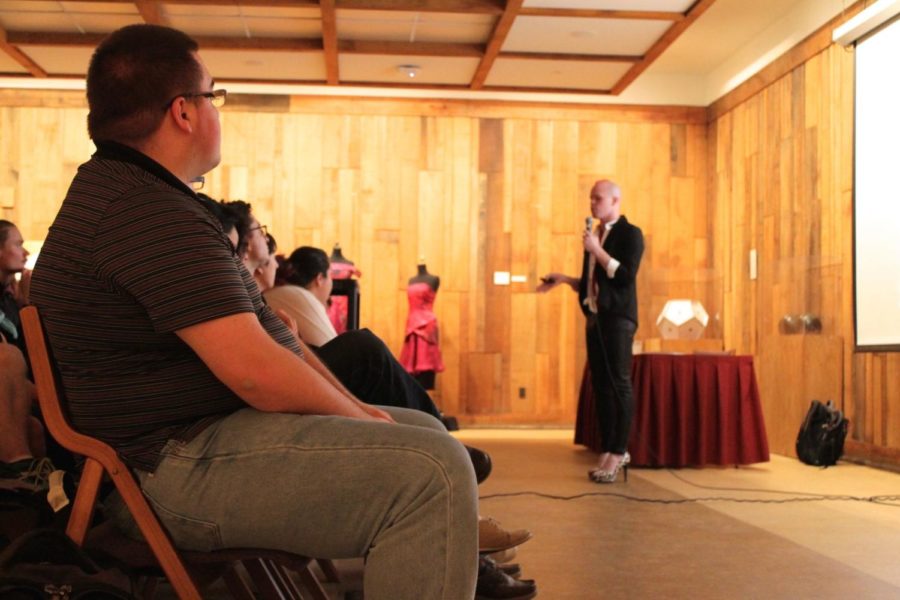Gay conversion therapy survivor advocates for ban on programs
The Pioneer Room was filled with an audience interested in Sam Brinton’s lecture on conversion therapy. Brinton spoke about his survivor story and also how to stop these actions from happening any longer. The lecture took place in the Memorial Union on April 7.
April 7, 2015
A fire engine red Mohawk and 5-inch heels make a nuclear engineer and conversion therapy survivor pretty hard to miss.
Conversion therapy is a hot topic in the Iowa Legislature. A bill to ban the practice has passed in the senate and is stuck in the house.
Sam Brinton, a graduate from MIT and nuclear advisor to Congress, advocates across the country, and even in front of the United Nations to end the practice all together.
“I was told I was the last gay person left in the world. I was told this was my experience because the government came through and killed all the other gay people because they brought the AIDs virus to America, and God hates you,” Brinton said.
Brinton’s parents were missionaries, people who travelled the world, lived in communes and helped third world countries build up communities and help their people.
He was still a small child when he and his friends found a Playboy magazine and the group looked through it. Brinton said he ran to his dad and told him he didn’t even feel a thing while looking at the images of the women, but that he did feel something about one of his boy friends.
“The next thing I remember was waking up in the E.R. because my father had knocked me out cold,” Brinton said. “When the beatings weren’t working, my parents sent me to conversion therapy.”
His time in therapy, the range of “torture” placed on him was anywhere from “pray the gay away” to electroshocks while he was shown pornographic images of men touching other men.
Cale Unzicker, freshman in pre-architecture, said he didn’t know anyone who went through conversion therapy before Brinton.
“I know this isn’t easy to hear, but it’s the point of this activism. There’s no data on the effects or what happens in the therapy because parents won’t sign a waiver to let us in to see what’s happening,” Brinton said. “It’s such a little known issue because a lot of people who go through it are quiet or commit suicide. I started this journey with 62 friends who had been through conversion therapy. I have 11 left.”
This is not a time to blame parents, Brinton said.
Brinton doesn’t blame his for doing what they thought would work.
“It’s a million dollar industry that’s leading to this type of pain,” Brinton said. “That’s actually part of the advocacy is helping survivors sue on the basis of consumer fraud.”
Along with his goal of ending the practice of conversion therapy, Brinton said he is a large proponent of seeking out mental health, even through therapists.
“I think a lot of survivors don’t go because it just brings back the memories of being in that torture. We are working on building a network of therapists who know how to help aid the recovery process,” he said. “Everyone should be focused on finding a mental health aspect in their lives.”
Jo Rod, a member of the Ames community for 54 years, said her husband is a mental health professional and he had a lot of experience with gay children coming into his office.
“He always thought it wasn’t a choice to be gay,” she said. “We have a nephew who is gay and we love him dearly. I couldn’t imagine him going through some of the therapy Sam described.”
Everyone in the audience, roughly 85 people and those who he spoke to in a human sexuality class today, were encouraged to use #BornPerfect on social media to inform others about conversion therapy.







